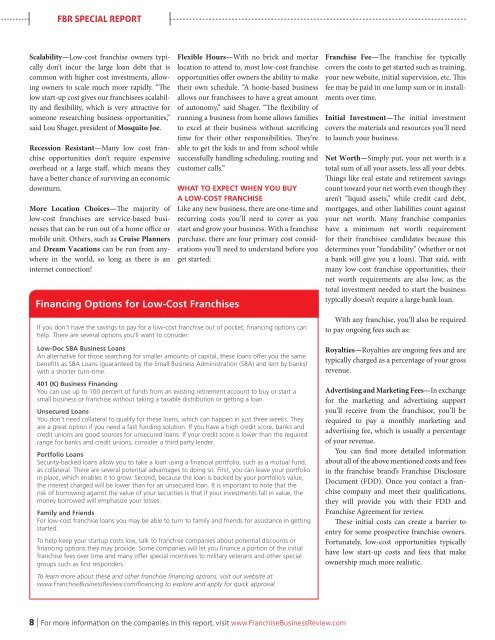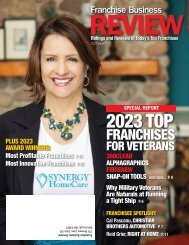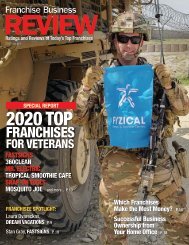FBR Issue 2 - 2019
Top Low Cost Franchises of 2019 | Multi-Unit Franchises | Rockstar Franchisees
Top Low Cost Franchises of 2019 | Multi-Unit Franchises | Rockstar Franchisees
You also want an ePaper? Increase the reach of your titles
YUMPU automatically turns print PDFs into web optimized ePapers that Google loves.
<strong>FBR</strong> SPECIAL REPORT<br />
Scalability—Low-cost franchise owners typically<br />
don’t incur the large loan debt that is<br />
common with higher cost investments, allowing<br />
owners to scale much more rapidly. “The<br />
low start-up cost gives our franchisees scalability<br />
and flexibility, which is very attractive for<br />
someone researching business opportunities,”<br />
said Lou Shager, president of Mosquito Joe.<br />
Recession Resistant—Many low cost franchise<br />
opportunities don’t require expensive<br />
overhead or a large staff, which means they<br />
have a better chance of surviving an economic<br />
downturn.<br />
More Location Choices—The majority of<br />
low-cost franchises are service-based businesses<br />
that can be run out of a home office or<br />
mobile unit. Others, such as Cruise Planners<br />
and Dream Vacations can be run from anywhere<br />
in the world, so long as there is an<br />
internet connection!<br />
Financing Options for Low-Cost Franchises<br />
Flexible Hours—With no brick and mortar<br />
location to attend to, most low-cost franchise<br />
opportunities offer owners the ability to make<br />
their own schedule. “A home-based business<br />
allows our franchisees to have a great amount<br />
of autonomy,” said Shager. “The flexibility of<br />
running a business from home allows families<br />
to excel at their business without sacrificing<br />
time for their other responsibilities. They’re<br />
able to get the kids to and from school while<br />
successfully handling scheduling, routing and<br />
customer calls.”<br />
WHAT TO EXPECT WHEN YOU BUY<br />
A LOW-COST FRANCHISE<br />
Like any new business, there are one-time and<br />
recurring costs you’ll need to cover as you<br />
start and grow your business. With a franchise<br />
purchase, there are four primary cost considerations<br />
you’ll need to understand before you<br />
get started:<br />
If you don’t have the savings to pay for a low-cost franchise out of pocket, financing options can<br />
help. There are several options you’ll want to consider:<br />
Low-Doc SBA Business Loans<br />
An alternative for those searching for smaller amounts of capital, these loans offer you the same<br />
benefits as SBA Loans (guaranteed by the Small Business Administration (SBA) and lent by banks)<br />
with a shorter turn-time.<br />
401 (K) Business Financing<br />
You can use up to 100 percent of funds from an existing retirement account to buy or start a<br />
small business or franchise without taking a taxable distribution or getting a loan.<br />
Unsecured Loans<br />
You don’t need collateral to qualify for these loans, which can happen in just three weeks. They<br />
are a great option if you need a fast funding solution. If you have a high credit score, banks and<br />
credit unions are good sources for unsecured loans. If your credit score is lower than the required<br />
range for banks and credit unions, consider a third party lender.<br />
Portfolio Loans<br />
Security-backed loans allow you to take a loan using a financial portfolio, such as a mutual fund,<br />
as collateral. There are several potential advantages to doing so. First, you can leave your portfolio<br />
in place, which enables it to grow. Second, because the loan is backed by your portfolio’s value,<br />
the interest charged will be lower than for an unsecured loan. It is important to note that the<br />
risk of borrowing against the value of your securities is that if your investments fall in value, the<br />
money borrowed will emphasize your losses.<br />
Family and Friends<br />
For low-cost franchise loans you may be able to turn to family and friends for assistance in getting<br />
started.<br />
To help keep your startup costs low, talk to franchise companies about potential discounts or<br />
financing options they may provide. Some companies will let you finance a portion of the initial<br />
franchise fees over time and many offer special incentives to military veterans and other special<br />
groups such as first responders.<br />
To learn more about these and other franchise financing options, visit our website at<br />
www.FranchiseBusinessReview.com/financing to explore and apply for quick approval.<br />
Franchise Fee—The franchise fee typically<br />
covers the costs to get started such as training,<br />
your new website, initial supervision, etc. This<br />
fee may be paid in one lump sum or in installments<br />
over time.<br />
Initial Investment—The initial investment<br />
covers the materials and resources you’ll need<br />
to launch your business.<br />
Net Worth—Simply put, your net worth is a<br />
total sum of all your assets, less all your debts.<br />
Things like real estate and retirement savings<br />
count toward your net worth even though they<br />
aren’t “liquid assets,” while credit card debt,<br />
mortgages, and other liabilities count against<br />
your net worth. Many franchise companies<br />
have a minimum net worth requirement<br />
for their franchisee candidates because this<br />
determines your “fundability” (whether or not<br />
a bank will give you a loan). That said, with<br />
many low-cost franchise opportunities, their<br />
net worth requirements are also low, as the<br />
total investment needed to start the business<br />
typically doesn’t require a large bank loan.<br />
With any franchise, you’ll also be required<br />
to pay ongoing fees such as:<br />
Royalties—Royalties are ongoing fees and are<br />
typically charged as a percentage of your gross<br />
revenue.<br />
Advertising and Marketing Fees—In exchange<br />
for the marketing and advertising support<br />
you’ll receive from the franchisor, you’ll be<br />
required to pay a monthly marketing and<br />
advertising fee, which is usually a percentage<br />
of your revenue.<br />
You can find more detailed information<br />
about all of the above mentioned costs and fees<br />
in the franchise brand’s Franchise Disclosure<br />
Document (FDD). Once you contact a franchise<br />
company and meet their qualifications,<br />
they will provide you with their FDD and<br />
Franchise Agreement for review.<br />
These initial costs can create a barrier to<br />
entry for some prospective franchise owners.<br />
Fortunately, low-cost opportunities typically<br />
have low start-up costs and fees that make<br />
ownership much more realistic.<br />
8 | For more information on the companies in this report, visit www.FranchiseBusinessReview.com


















